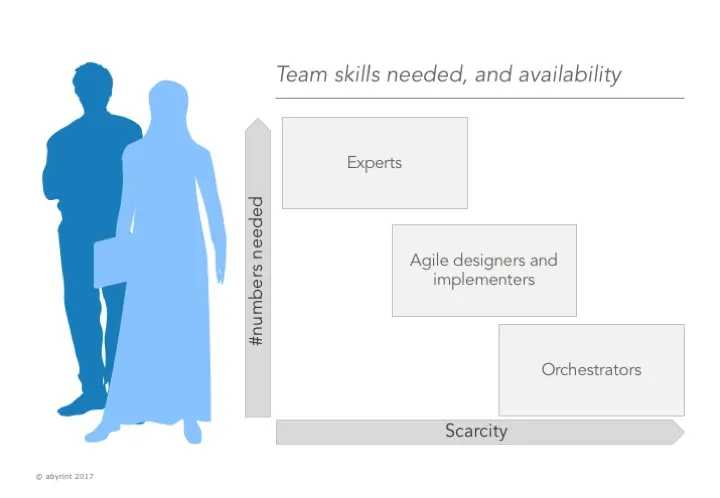Core Competencies for Change Management Units in Institutional Reform
Published on: Mon Dec 11 2017 by Ivar Strand
What types of skills does the team need?
The team to rebuild government will need three types of skills and a strategy for recruiting them:
- Subject matter experts,
- Agile development managers, and
- Orchestrators.
Expert talent is most easily found your own organization. They are also easily sourced from he outside.
Talent for the last category, orchestrators, is really difficult to find and count yourselves lucky if you have them.
The team will be drawn from those communities that have experienced project design or implementation. This could be in other parts of government, or supplemented by short term external capabilities.
At Abyrint we work with fragile states governments. We support change management teams across several institutions. We find that the teams work best when there are three types of capabilities in the team:
Category 1: Experts and expertise
This is specialist knowledge, typically stemming from experience of executing core processes in your government, or in another government.
These experts should also be able to share their understanding, and provide insights from experience that are relevant to the problem at hand. That is sometimes challenging for experts.
Recruiting from the expert community is often easier than the other categories of talent needed. The talent is globally less scarce, indeed, the best experts on your systems are already in your organization. There are line staff in your organization who fit this description. There is also accessible external expertise that can be helpful.
A challenge is often that experts may not have a full A-Z view of the work, they are only familiar with their key parts. This creates a bias. Also, expertise drawn from line work experience is highly focused at executing tasks in the current, or similar environment. They are not necessarily experts in capacity building, change management, or in design and evaluation of other options.
Exhibit 1: Skills and availability of the team

Category 2: Agile development managers
We are using the buzzword “agile”, but it is very fitting.
These are the skills that enable your organization to design solutions, and importantly, manage agile approaches to implementation. These can design prototypes, or determine fittability with other systems, and manage iterative implementation pathways.
This is scarce talent. Very few organizations will have redundancy of personnel with these qualities.
It is also difficult to identify. There are reports from HR departments of businesses around the world that claim that only about a third of recruitments for such roles are successful. It is difficult to identify those persons fitted for managing agile approaches to begin with, and even more difficult to find those who can do this within your organization.
The good news is that this is trainable. To an extent, talented people can be trained in agile methodologies and principles and will quickly adapt. One may need to ensure that there is directed effort at skills development, through training or experience.
Category 3: Orchestrators
This is the scarcest talent. The good news is that you will not need many such people.
This is about people who can recognize transitory windows of opportunity. Those that can identify the winning innovations, that are actual creative solutions to a problem, and not a waste of time. Those that can recognize how to scale and fit a solution across the system, define execution playbooks, and align resource allocation.
Such raw talent is very scarce. It mostly requires a good portion of raw talent and aptitude. If you have such talent in your organization, nurture them carefully, groom them deliberately, and allow for exposure to key orchestrator functions to help them strengthen their experience base.
This team will be critical across most rebuilding efforts in your government, and for many years.
At Abyrint we have written a series of articles to capture the ideas behind the capacity building work. Most of our support is very specific, targeted at resolving complex issues of institution building, and it is guided by principles like this.
Ivar Strand @abyrint.



